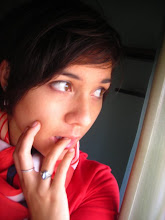On Wednesday I had my regular English lesson with Giorgia, an educational anthropology student who hopes to improve her pronunciation for an international education conference in Vienna next October. As we read aloud together the introduction to Paul Rabinow's book Reflections on Fieldwork in Morocco, a nonfictional account of his time in Morocco in the 1960s, I came across a ringing bell: dépaysement. This French word was similar to an Italian word I'd discovered with delight some days before, spaesato, in a magazine article about the plight of Italy's current youth generation. I noted paese, or country, and the prefix s, which usually indicates an opposite like un- or dis- in English. Un-countried. The electronic dictionary told me it meant 'out of one's element; uncomfortable.' A state of unease for lack of being in one's own homeland. Rabinow, describing the various personal and historical reasons for setting off for North Africa, was compelled by Lévi-Strauss's obscure concept of dépaysement, a "paradoxical call for a distancing that would allow one to return more profoundly home." Whoa, whoa-- I had to shake my head to clear it, and take a break from the lesson to explain to Giorgia with wild gestures that this was exactly what I was doing! That, without knowing there was a name for this particular journey, this had been my intention all along, not only of my post-graduate year in Italy but of my initial departure from Northern California for Colorado Springs. Remember the end of high school when all directions pointed away from California, not because I didn't like it but precisely because I adored it? I couldn't explain it then. I didn't know how to tell my friends, my teachers, my family, that I needed to leave in order to come back. All that lost and sad and restless I used to feel in El Cerrito was not in vain, but in fact has brought me right here the glass of chilled white wine, the paperback book about Jews in Palestine, a sparkling blue Colorado College ring, a haircut that looks best after 3 days without shampoo.
"Every man," wrote Françoise-Renè Chateaubriand, "carries within him a world which is composed of all that he has seen and loved, and to which he constantly returns, even when he is travelling through, and seems to be living in, some different world." (This same French philosopher once wrote, "One inhabits, with a full heart, an empty world." Too bad he lived in the 1800s, or else I'd try to get him to meet me for a glass of wine at the jazz club on Via Gioberti.) "Henceforth," said Lèvi-Strauss of Chateaubriand, "it will be possible to bridge the gap between the two worlds." All these quotes of quotes... maybe we do it in order to validate our own histories, taking comfort in the words of those who have already gone this way. Italians use the same word for "story" and "history." I feel like I've traveled so many different worlds over the past four years - Colorado, Mexico, Florence, London, Petaluma - each one leaving traces within me like so many dusty pebbles, to carry around in my pocket in hopes of one day having the time and audience to explain the handfuls. At the end of June, 2008, I drew a picture of Torino so I might remember what I have seen and loved: There are so many little idiosyncracies about life in Italy that I forget to write down each day, like seeing a woman ride her Vespa (which means "bee") in stilettos, seeing a young couple on a park bench popping each other's zits, going to the supermarket and marveling at the smaller sizes of things. My favorite is the sleek 3-pack of beer. It's so silly! But wonderful, too, the way we had to re-organize the entire car to fit 5 bags of groceries into the trunk. That's how compact and economical they are with their space. And so with their waster, their home organisation, kitchen-- everything (except Ruggi's room of toys) is useful, and has a place to live. There is little waste, and the luxury lies more in richness and value than in size or stature. This is true of the apartments, stacked one atop another all throughout the city; the small cars, even their park/garden across the street, not exactly the sprawling lawns of London but a mini-concrete pedestrian area with along, narrow strip of play equipment. The trees are big, the buildings are tall, but lives are lived on an altogether more personal scale.
Speaking of space and luxury, another gem from one of my French philosophers: "Freedom is neither a legal invention nor a philosophical conquest, the cherished possession of civilizations more valid than others because they alone have been able to create or preserve it. It is the outcome of an objective relationship between an individual and the space he occupies, between the consumer and the resources at his disposal." I have learned that this family, part of Northern Italy's upper crust, for all their wealth and Europeanness and domestic picture-perfection, have their tribulations just as I do or anyone else does. Freedom boils down to a matter of one's relationship to one's space; and self-identity, to the sum of one's previous choices and experiences.
With just eleven more weeks here in Torino, I can feel the end of the Distancing start to curl up at the edges to reveal the pink, painful beginning of the Coming Fully Home.
The atmosphere thickens, everywhere.

Subscribe to:
Post Comments (Atom)

No comments:
Post a Comment